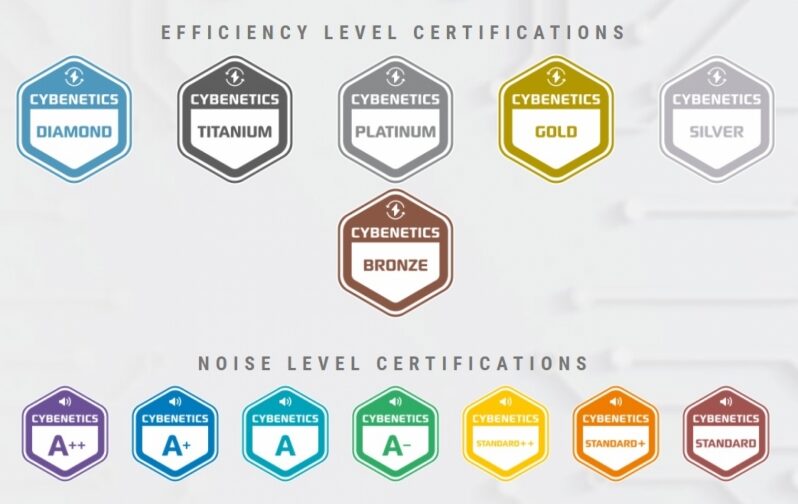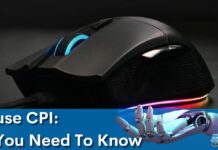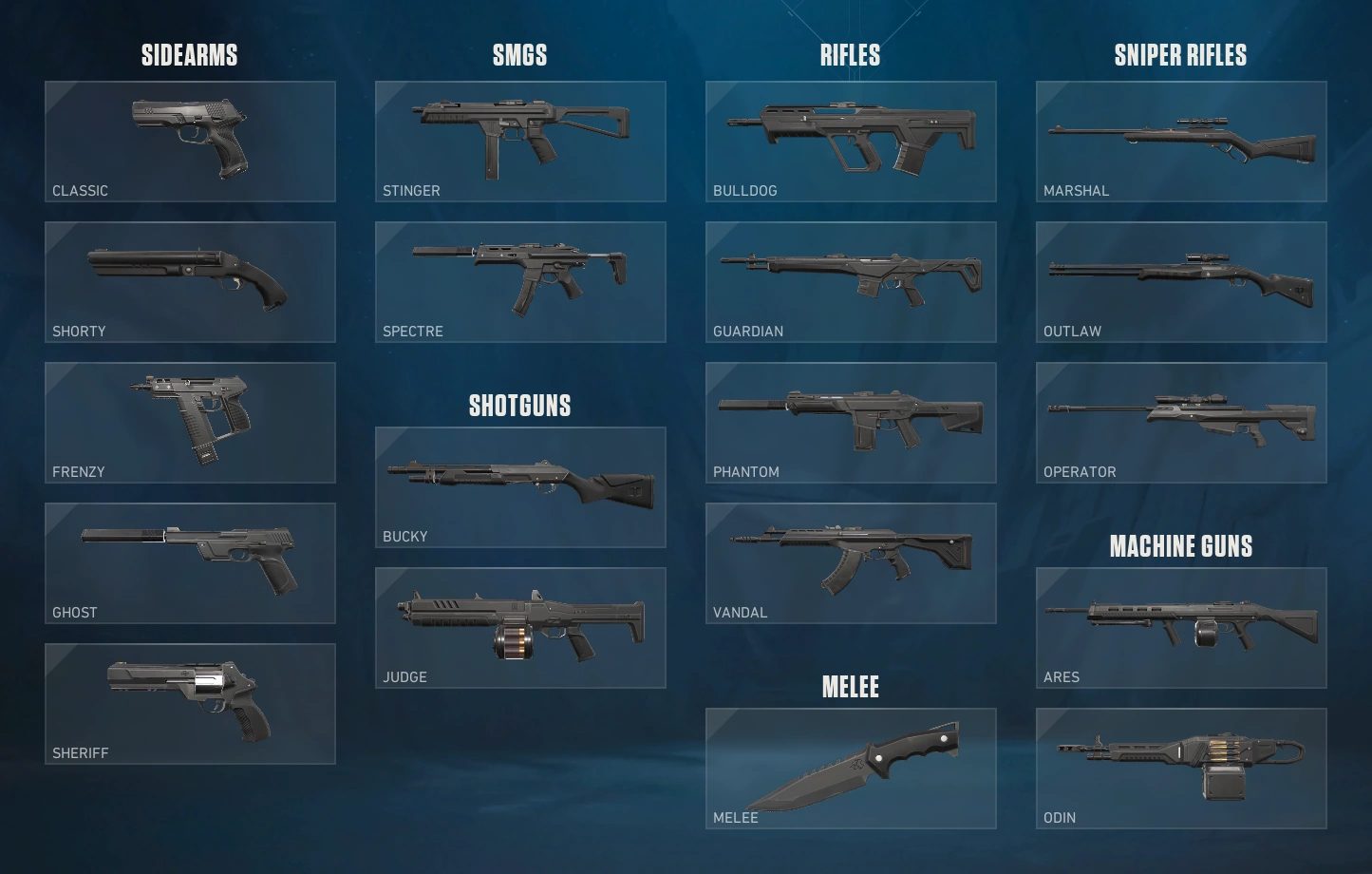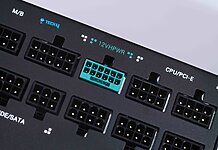Cybenetics is an independent assessment that exceeds the 80 PLUS certification and focuses on efficiency and noise levels. Let’s see what a Cybenetics certification is, its levels, and why it’s gaining recognition in the community.
Key Takeaways
- Cybenetics certification is a new standard for evaluating the efficiency of a PSU, including its noise levels at a realistic temperature.
- Cybenetics has two certifications: ETA certification, which measures efficiency, and LAMDA certification, which measures noise levels.
- 80 Plus doesn’t provide accurate data, so the cybenetics program has strict testing, which is better.
What Is Cybenetics Certification?
Cybenetics certification is a new set of standards for evaluating the efficiency of an AC-DC PSU while also considering noise levels. This certification is designed to give a more comprehensive and detailed picture of PSU efficiency than the 80 Plus certification[1].
Cybenetics Certification Levels

ETA Certification
ETA certification focuses on overall efficiency[2], which ranges from Bronze to Diamond (most efficient).
| Efficiency Levels (115V) | Efficiency (%) | Power Factor | 5V Standby Efficiency (%) | Standby Power (W) |
|---|---|---|---|---|
| Bronze | 82 - 85 | 0.950 | 71 | 0.25 |
| Silver | 85 - 87 | 0.960 | 73 | 0.22 |
| Gold | 87 - 89 | 0.970 | 75 | 0.19 |
| Platinum | 89 - 91 | 0.975 | 76 | 0.16 |
| Titanium | 91 - 93 | 0.980 | 77 | 0.13 |
| Diamond | 93 or greater | 0.985 | 79 | 0.10 |
LAMDA Certification
LAMDA certification assesses noise output[3], which ranges from LAMDA-Standard to LAMDA-A++ (dead silent).
| Noise Levels | Requirements dB(A) |
|---|---|
| Standard | 40 - 45 |
| Standard+ | 35 - 40 |
| Standard++ | 30 - 35 |
| A- | 25 - 30 |
| A | 20 - 25 |
| A+ | 15 - 20 |
| A++ | 15 or less |
Why Cybenetics Certification Is Better Than 80 Plus?
Cybenetics offers several advantages over the well-established 80 Plus, which are given below:
- Stricter Testing: 80 Plus testing is conducted at 23 degrees Celsius[4]. However, the temperature inside the computer is higher because PSU efficiency increases at lower temperatures. Cybenetics testing is conducted at 30 to 32 degrees Celsius[5], which is more realistic and provides a wider picture of the performance.
- Noise Evaluation: 80 Plus doesn’t consider noise[1]. However, Cybenetics LAMDA certification directly addresses this issue, a significant factor for many users.
- Transparency: Cybenetics provides detailed reports of their testing and results. It also continuously updates its standards compared to the 80 Plus certification.
Cybenetics is gradually becoming popular in the gaming community due to its comprehensive approach and transparency. If you plan to buy a power supply, consider checking it in addition to 80 Plus.
Helpful Resources By Tech4Gamers:
- What Is TDP, Factors, Overclocking & Guide
- How Long Do Power Supplies Last?
- Does Overclocking Reduce CPU Lifespan?
References:
- 80 PLUS vs Cybenetics: PSU ratings explained | CORSAIR: EXPLORER. (n.d.). https://www.corsair.com/us/en/explorer/diy-builder/power-supply-units/80-plus-vs-cybenetics/
- Cybenetics Labs – PSU Efficiency & Noise Level Certifications – ETA. (n.d.). https://www.cybenetics.com/index.php?option=eta_9-51-40
- Cybenetics Labs – PSU Efficiency & Noise Level Certifications – LAMBDA (PSUs). (n.d.). https://www.cybenetics.com/index.php?option=lambda-(psus)
- Can We Trust the 80 Plus Certification? | Hardware Secrets. (n.d.). https://web.archive.org/web/20141025042343/http://www.hardwaresecrets.com/article/Can-We-Trust-the-80-Plus-Certification/856/1
- Cybenetics Labs – PSU Efficiency & Noise Level Certifications – Methodology – Methodology. (n.d.). https://www.cybenetics.com/index.php?option=methodology
Frequently Asked Questions
Cybenetics is an independent organization that sets standards and provides certifications for power supply units.
The main difference between cybenetics and 80+ is that cybenetics is more strict, considers realistic temperatures, and considers noise levels.
Thank you! Please share your positive feedback. 🔋
How could we improve this post? Please Help us. 😔
[Errors Troubleshooting Expert]
Arsalan Shakil (aka GuyThatDoesEverything on YouTube) is a PC Tech Enthusiast and Electronic Geek. With over 10+ years of experience in Electronics, he then decided to explore Software Engineering to design embedded products and automate existing hardware solutions.
When he started tearing down old cameras to understand how they worked, he was shocked (literally, when he got zapped by a flash discharge capacitor), giving him the power (debatable) to fall in love with videography/photography. He also started making some fun videos that later became YouTube tech reviews.
Skills:
- 10+ years of experience in Electronics design, embedded solutions, and prototyping
- Majored in Software Engineering
- Research paper publication in IEEE for Embedded Military Uniform & LoRa WAN wireless technology
- Specialized in IoT Solutions
- PC Enthusiast & PC Modder
In his local region, he’s known to expose cheap PSU brands, often claiming fake certification or false claims on the box. He’s a true nerd and needed some friends in his life. Then he met some guys who work at Tech4Gamers, and they also came out to be equal nerds who suggested he join Tech4Gamers as a Hardware Expert.


 Threads
Threads![How Long Do Power Supplies Last? [Explained] HOW LONG DO POWER SUPPLIES LAST?](https://tech4gamers.com/wp-content/uploads/2022/12/HOW-LONG-DO-POWER-SUPPLIES-LAST-1-218x150.jpg)
![When Xbox Is Off, Turn Off Storage [Feature Explained] When Xbox Is Off, Turn Off Storage](https://tech4gamers.com/wp-content/uploads/2023/08/When-Xbox-Is-Off-Turn-Off-Storage-1.jpg)


